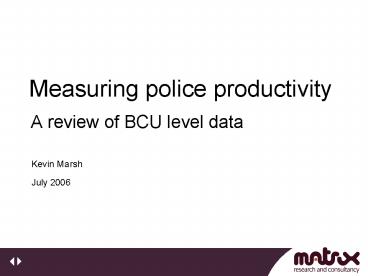Measuring police productivity - PowerPoint PPT Presentation
1 / 25
Title:
Measuring police productivity
Description:
deflated. adjusted for the quality of inputs. Police: 2 sources input data ... No need deflate. reactive / individual. proactive/ collective. How good is ABC? Concerns ... – PowerPoint PPT presentation
Number of Views:103
Avg rating:3.0/5.0
Title: Measuring police productivity
1
Measuring police productivity
- A review of BCU level data
Kevin Marsh
July 2006
2
Introduction
- Project (2005) Matrix commissioned to assess the
potential of ABC data - measure police performance
- improve police performance
- Presentation
- Background policy methodology
- Measuring police inputs
- Measuring police outputs
- Analysis the comparative efficiency of BCUs
- Discussion
3
Policy background
- General public sector
- 1997/8 Comprehensive Spending Review need for
savings - 2001 elections Office of Public Service Reform
set up - Gershon Report (2004) specific efficiency
proposals - Police
- The White Paper Building Communities, Beating
Crime - Police efficiency plans 3 cost saving per year
(2005/06 - 2007/08) - PPAF measures to judge police performance
4
Methodological context
- Definition of productivity
- Sum of weighted outputs/expenditure
- International standards for measurement of
productivity - United Nations System of National Accounts (SNA)
- European System of Account (ESA 95)
- UK measurement of productivity
- Atkinson review (2005) recommend adoption of SRA
ESA95 - ONS test recommendations
- improvements to health, education, personal
social services, administration of social
security and fire services
5
Challenges to measuring inputs
- Atkinson (2005) standards for input measurement
- comprehensive
- personnel
- procurement of goods and services
- capital
- deflated
- adjusted for the quality of inputs
- Police 2 sources input data
- net revenue expenditure (ODPM, HO, LA)
- activity-based costing
6
Activity based costing
reactive / individual
proactive/ collective
Data available number of hours (not cost) No
need deflate
7
How good is ABC?
Allow distinguish inputs by ACTIVITY and CRIME
TYPE
- Concerns
- ignore some activities
- seasonality
- self-reported data
- response rate 80
- capital procurement
- quality (grade/cost)
- not record downtime
- Improvements
- increase officer awareness of the benefits of
the data - checks on the validity
- timing of data collection
8
How many hours to BCUs spend reacting to violent
crime?
9
How many hours do BCUs spend reacting to each
violent crime?
10
Challenges to measuring output
- Activity types collective (defence), individual
(education) - universal protection of public collective
- clearing up crime individual
- Output measures detection
- Adjustments
- alternative explanations of change in output
- quality of output
- value of output (weight?)
11
Are detection rates related to the time spend on
each violent crime?
12
Are detection rates related to the time spend on
each violent crime?
13
How efficient are BCUs at detecting violent crime?
14
How efficient are BCUs at detecting violent crime?
Assumption detection rate explained by
efficiency of BCU inputs
15
Does efficiency depend on BCU family?
16
Does the efficiency of detection vary between
crime types?
17
Does the efficiency of detection vary between
crime types?
18
Does the efficiency of detection vary between
crime types?
Technical efficiency
Allocative efficiency
19
Does the efficiency of detection vary between
crime types?
20
Does the efficiency of detection vary between
crime types?
Value of a detection?
21
How should detections be weighted?
22
How should detections be weighed?
23
How do weights impact the efficiency of resource
allocation?
24
Conclusion how use/improve analysis?
- Use further investigation of productivity trends
identified - Improve
- inputs ABC allow measure services provided by
police - improve seasonality, accuracy of self report,
capital measure, quality/costs - outputs
- detection broader impact (satisfaction)
- collective define output, attribute change
- statistical model (DEA/SFA) appropriate, data?
- literature review
- project budget marginal analysis
25
QUESTIONS?

